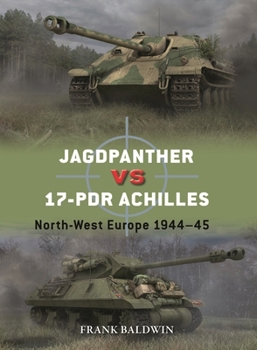Jagdpanther Vs 17-PDR Achilles: North-West Europe 1944-45
This is the story of the 17-pdr Achilles and the Jagdpanther, two formidable tracked anti-tank guns that clashed in North-West Europe during 1944-45.
Both mounting their country's most effective anti-tank ordnance on a tracked chassis, the 17-pdr Achilles and the Jagdpanther were arguably the best self-propelled anti-tank guns used by the British, Canadian and German forces that fought in North-West Europe during 1944-45. Featuring specially commissioned artwork and carefully chosen photographs, this is the story of the two types' development, combat use and legacy in the closing stages of World War II in North-West Europe. Based upon the mobile, lightly armoured M10 design originally developed for the US Army, the Achilles had its main armament, the 17-pounder QF anti-tank gun, mounted in a fully revolving turret. Conversely, the low-profile, heavily armoured Jagdpanther had its formidable 8.8cm PaK 43 cannon mounted in a fixed casemate. Both crewed by artillerymen rather than tankers, the Achilles and the Jagdpanther were anti-tank guns, not tanks or assault guns; their main purpose was to knock out enemy tanks, not to engage infantry or lead an assault or pursuit. Sometimes they faced each other, notably in the Reichswald fighting of February 1945. Fully illustrated, this work tells the story of their development and tactical use as well as what happened when these two very different designs met in combat.Format:Paperback
Language:English
ISBN:1472862716
ISBN13:9781472862716
Release Date:June 2025
Publisher:Osprey Publishing (UK)
Length:80 Pages
Weight:1.00 lbs.
Dimensions:1.0" x 7.2" x 9.8"
Customer Reviews
0 rating





